不定式省略to的九种情况
省略to的动词不定式情况举例

省略to的动词不定式情况举例以下是小编为大家列举的省略to 的动词不定式情况,希望能帮助大家更好地认识不定式,提高英语水平。
1) 情态动词 ( 除ought 外,ought to):2) 使役动词 let, have, make:3) 感官动词 see, watch, look at, notice , observe, hear, listen to, smell, feel, find 等后作宾补,省略to。
注意:在被动语态中则to 不能省掉。
I saw him dance.=He was seen to dance.The boss made them work the whole night.=They were made to work the whole night.4) would rather,had better:5) Why… / why not…:6) help 可带to,也可不带to, help sb (to) do sth:7) but和except:but前是动词do时,后面出现的动词用不带to的动词不定式。
8) 由and, or和than连接的两个不定式,第二个to 可以省去:9) 通常在discover, imagine, suppose, think, understand等词后,可以省去to be:He is supposed (to be) nice. 他应该是个好人。
举例:He wants to do nothing but go out.He wants to move to France and marry the girl.比较: He wants to do nothing but go out.He wants to believe anything but to take the medicine.典型例题1) ---- I usually go there by train.---- Why not ___ by boat for a change?A. to try goingB. trying to goC. to try and goD. try going答案:D. why not 后面接不带to 的不定式,因此选D。
省略to的动词不定式情况举例
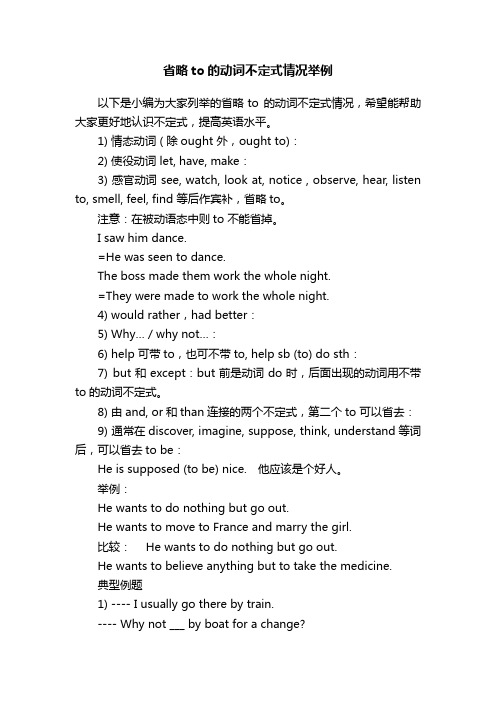
省略to的动词不定式情况举例以下是小编为大家列举的省略to 的动词不定式情况,希望能帮助大家更好地认识不定式,提高英语水平。
1) 情态动词 ( 除ought 外,ought to):2) 使役动词 let, have, make:3) 感官动词 see, watch, look at, notice , observe, hear, listen to, smell, feel, find 等后作宾补,省略to。
注意:在被动语态中则to 不能省掉。
I saw him dance.=He was seen to dance.The boss made them work the whole night.=They were made to work the whole night.4) would rather,had better:5) Why… / why not…:6) help 可带to,也可不带to, help sb (to) do sth:7) but和except:but前是动词do时,后面出现的动词用不带to的动词不定式。
8) 由and, or和than连接的两个不定式,第二个to 可以省去:9) 通常在discover, imagine, suppose, think, understand等词后,可以省去to be:He is supposed (to be) nice. 他应该是个好人。
举例:He wants to do nothing but go out.He wants to move to France and marry the girl.比较: He wants to do nothing but go out.He wants to believe anything but to take the medicine.典型例题1) ---- I usually go there by train.---- Why not ___ by boat for a change?A. to try goingB. trying to goC. to try and goD. try going答案:D. why not 后面接不带to 的不定式,因此选D。
不定式符号to的省略
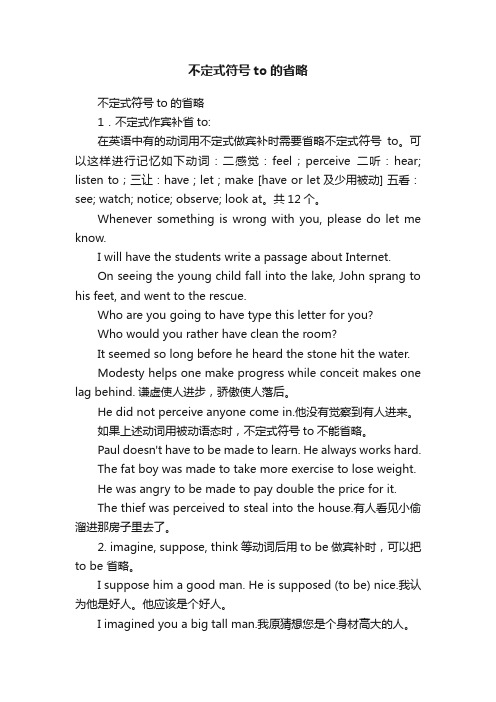
不定式符号to的省略不定式符号to的省略1.不定式作宾补省to:在英语中有的动词用不定式做宾补时需要省略不定式符号to。
可以这样进行记忆如下动词:二感觉:feel;perceive二听:hear; listen to;三让:have ; let ; make [have or let及少用被动] 五看:see; watch; notice; observe; look at。
共12个。
Whenever something is wrong with you, please do let me know.I will have the students write a passage about Internet.On seeing the young child fall into the lake, John sprang to his feet, and went to the rescue.Who are you going to have type this letter for you?Who would you rather have clean the room?It seemed so long before he heard the stone hit the water.Modesty helps one make progress while conceit makes one lag behind. 谦虚使人进步,骄傲使人落后。
He did not perceive anyone come in.他没有觉察到有人进来。
如果上述动词用被动语态时,不定式符号to不能省略。
Paul doesn't have to be made to learn. He always works hard.The fat boy was made to take more exercise to lose weight.He was angry to be made to pay double the price for it.The thief was perceived to steal into the house.有人看见小偷溜进那房子里去了。
九种不定式省略to的情况
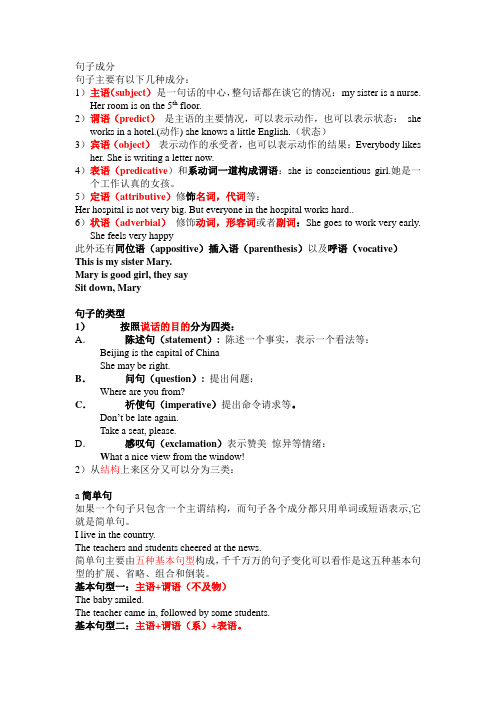
句子成分句子主要有以下几种成分:1)主语(subject)是一句话的中心,整句话都在谈它的情况:my sister is a nurse.Her room is on the 5th floor.2)谓语(predict)是主语的主要情况,可以表示动作,也可以表示状态:she works in a hotel.(动作) she knows a little English.(状态)3)宾语(object)表示动作的承受者,也可以表示动作的结果:Everybody likes her. She is writing a letter now.4)表语(predicative)和系动词一道构成谓语:she is conscientious girl.她是一个工作认真的女孩。
5)定语(attributive)修饰名词,代词等:Her hospital is not very big. But everyone in the hospital works hard..6)状语(adverbial)修饰动词,形容词或者副词:She goes to work very early.She feels very happy此外还有同位语(appositive)插入语(parenthesis)以及呼语(vocative)This is my sister Mary.Mary is good girl, they saySit down, Mary句子的类型1)按照说话的目的分为四类:A.陈述句(statement): 陈述一个事实,表示一个看法等:Beijing is the capital of ChinaShe may be right.B.问句(question): 提出问题:Where are you from?C.祈使句(imperative)提出命令请求等。
Don’t be late again.Take a seat, please.D.感叹句(exclamation)表示赞美惊异等情绪:W hat a nice view from the window!2)从结构上来区分又可以分为三类:a简单句如果一个句子只包含一个主谓结构,而句子各个成分都只用单词或短语表示,它就是简单句。
需要省略to的不定式的情况有
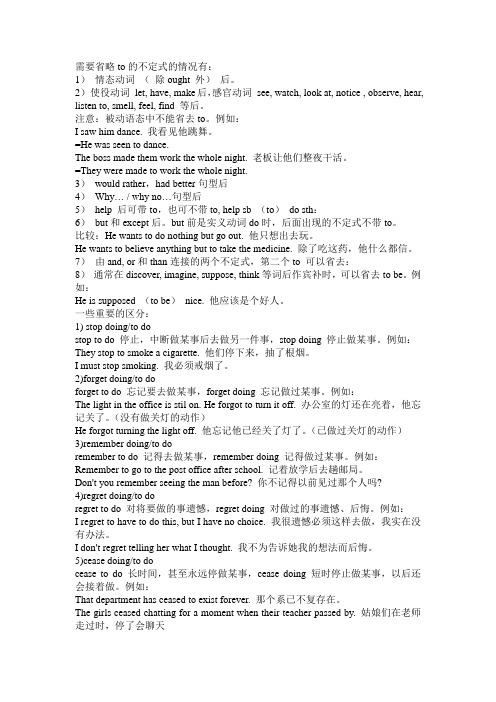
需要省略to的不定式的情况有:1)情态动词(除ought 外)后。
2)使役动词let, have, make后,感官动词see, watch, look at, notice , observe, hear, listen to, smell, feel, find 等后。
注意:被动语态中不能省去to。
例如:I saw him dance. 我看见他跳舞。
=He was seen to dance.The boss made them work the whole night. 老板让他们整夜干活。
=They were made to work the whole night.3)would rather,had better句型后4)Why… / why no…句型后5)help 后可带to,也可不带to, help sb (to)do sth:6)but和except后。
but前是实义动词do时,后面出现的不定式不带to。
比较:He wants to do nothing but go out. 他只想出去玩。
He wants to believe anything but to take the medicine. 除了吃这药,他什么都信。
7)由and, or和than连接的两个不定式,第二个to 可以省去:8)通常在discover, imagine, suppose, think等词后作宾补时,可以省去to be。
例如:He is supposed (to be)nice. 他应该是个好人。
一些重要的区分:1) stop doing/to dostop to do 停止,中断做某事后去做另一件事,stop doing 停止做某事。
例如:They stop to smoke a cigarette. 他们停下来,抽了根烟。
I must stop smoking. 我必须戒烟了。
2)forget doing/to doforget to do 忘记要去做某事,forget doing 忘记做过某事。
动词不定式省略to的9种情况
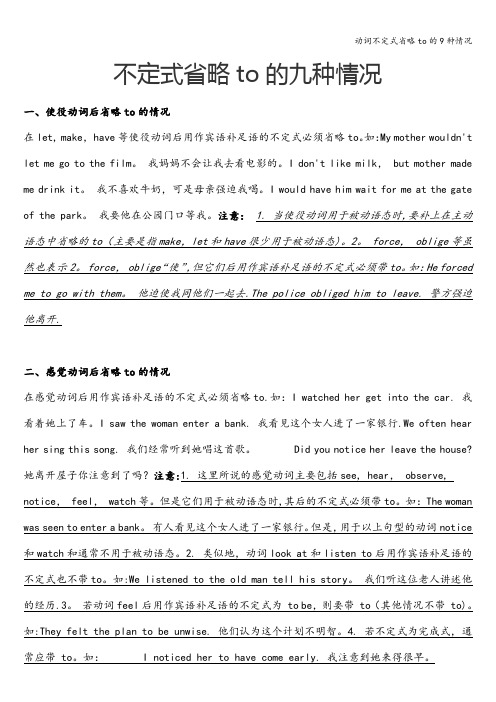
不定式省略to的九种情况一、使役动词后省略to的情况在let, make, have等使役动词后用作宾语补足语的不定式必须省略to。
如:My mother wouldn't let me go to the film。
我妈妈不会让我去看电影的。
I don't like milk, but mother made me drink it。
我不喜欢牛奶,可是母亲强迫我喝。
I would have him wait for me at the gate of the park。
我要他在公园门口等我。
注意:1. 当使役动词用于被动语态时,要补上在主动语态中省略的to(主要是指make,let和have很少用于被动语态)。
2。
force, oblige等虽然也表示2。
force, oblige“使”,但它们后用作宾语补足语的不定式必须带to。
如:He forced me to go with them。
他迫使我同他们一起去.The police obliged him to leave. 警方强迫他离开.二、感觉动词后省略to的情况在感觉动词后用作宾语补足语的不定式必须省略to.如:I watched her get into the car. 我看着她上了车。
I saw the woman enter a bank. 我看见这个女人进了一家银行.We often hear her sing this song. 我们经常听到她唱这首歌。
Did you notice her leave the house? 她离开屋子你注意到了吗?注意:1. 这里所说的感觉动词主要包括see, hear, observe, notice, feel, watch等。
但是它们用于被动语态时,其后的不定式必须带to。
如:The woman was seen to enter a bank。
有人看见这个女人进了一家银行。
不定式省略to的10种情况
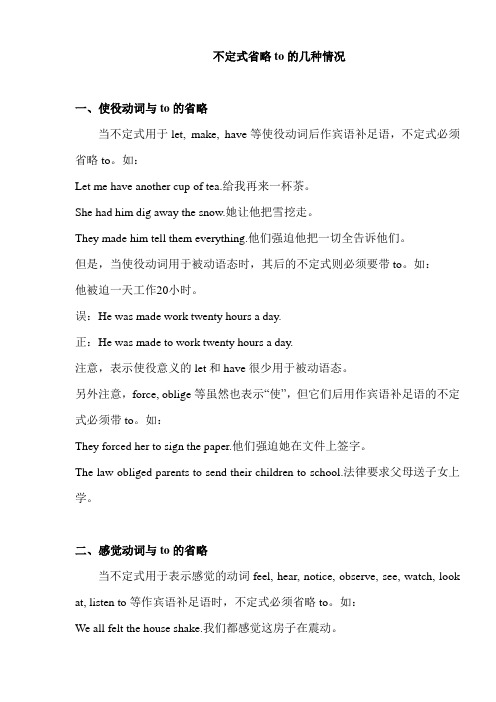
不定式省略to的几种情况一、使役动词与to的省略当不定式用于let, make, have等使役动词后作宾语补足语,不定式必须省略to。
如:Let me have another cup of tea.给我再来一杯茶。
She had him dig away the snow.她让他把雪挖走。
They made him tell them everything.他们强迫他把一切全告诉他们。
但是,当使役动词用于被动语态时,其后的不定式则必须要带to。
如:他被迫一天工作20小时。
误:He was made work twenty hours a day.正:He was made to work twenty hours a day.注意,表示使役意义的let和have很少用于被动语态。
另外注意,force, oblige等虽然也表示“使”,但它们后用作宾语补足语的不定式必须带to。
如:They forced her to sign the paper.他们强迫她在文件上签字。
The law obliged parents to send their children to school.法律要求父母送子女上学。
二、感觉动词与to的省略当不定式用于表示感觉的动词feel, hear, notice, observe, see, watch, look at, listen to等作宾语补足语时,不定式必须省略to。
如:We all felt the house shake.我们都感觉这房子在震动。
I heard him go down the stairs.我听见他下楼了。
Did you notice her leave the house?她离开屋子你注意到了吗?I watched her get into the car.我看着她上了车。
但是,当feel后用作宾语补足语的不定式为to be时,则不能省略to。
动词不定式省略to的9种情况

不定式省略to的九种情况一、使役动词后省略to的情况在let,make,have等使役动词后用作宾语补足语的不定式必须省略to。
如:Mymotherwouldn’tletmegotothefilm.我妈妈不会让我去看电影的。
Idon’tlikemilk,butmothermademedrinkit.我不喜欢牛奶,可是母亲强迫我喝。
Iwouldhavehimwaitformeatthegateofthepark.我要他在公园门口等我。
注意:1.当使役动词用于被动语态时,要补上在主动语态中省略的to(主要是指make,let和have很少用于被动语态)。
2.force,oblige等虽然也表示2.force,oblige“使”,但它们后用作宾语补足语的不定式必须带to。
如:Heforcedmetogowiththem.他迫使我同他们一起去。
Thepolice obligedhimtoleave.警方强迫他离开。
二、感觉动词后省略to的情况在感觉动词后用作宾语补足语的不定式必须省略to。
如:Iwatchedhergetinto thecar.我看着她上了车。
Isawthewomanenterabank.我看见这个女人进了一家银行。
Weoftenhearhersingthissong.我们经常听到她唱这首歌。
Didyounoticeherleavethehouse?她离开屋子你注意到了吗?注意:1.这里所说的感觉动词主要包括see,hear,observe,notice,feel,watch等。
但是它们用于被动语态时,其后的不定式必须带to。
如:Thewomanwasseen toenterabank.有人看见这个女人进了一家银行。
但是,用于以上句型的动词notice和watch和通常不用于被动语态。
2.类似地,动词lookat和listento 后用作宾语补足语的不定式也不带to。
如:Welistenedtotheoldmantellhissto r y .我们听这位老人讲述3.若动词feel 后用作宾语补足语的不定 式为t o b e ,t o (其他情to)。
省略 to 的不定式
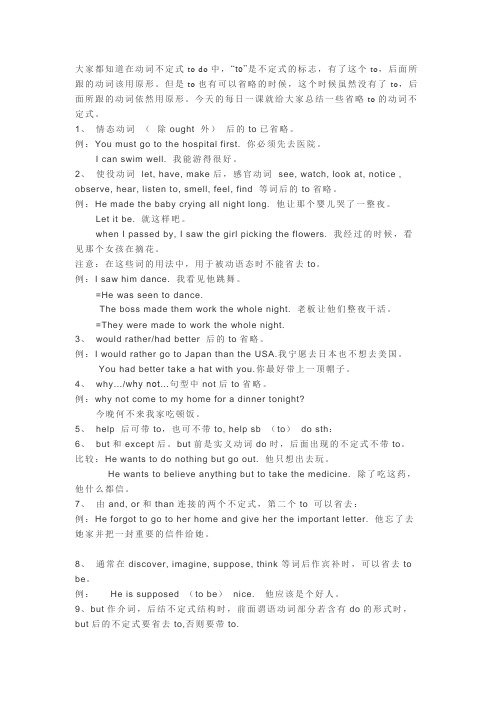
大家都知道在动词不定式to do中,“to”是不定式的标志,有了这个to,后面所跟的动词该用原形。
但是to也有可以省略的时候,这个时候虽然没有了to,后面所跟的动词依然用原形。
今天的每日一课就给大家总结一些省略to的动词不定式。
1、情态动词(除ought 外)后的to已省略。
例:You must go to the hospital first. 你必须先去医院。
I can swim well. 我能游得很好。
2、使役动词let, have, make后,感官动词see, watch, look at, notice , observe, hear, listen to, smell, feel, find 等词后的to省略。
例:He made the baby crying all night long. 他让那个婴儿哭了一整夜。
Let it be. 就这样吧。
when I passed by, I saw the girl picking the flowers. 我经过的时候,看见那个女孩在摘花。
注意:在这些词的用法中,用于被动语态时不能省去to。
例:I saw him dance. 我看见他跳舞。
=He was seen to dance.The boss made them work the whole night. 老板让他们整夜干活。
=They were made to work the whole night.3、would rather/had better 后的to省略。
例:I would rather go to Japan than the USA.我宁愿去日本也不想去美国。
You had better take a hat with you.你最好带上一顶帽子。
4、why…/why not…句型中not后to省略。
例:why not come to my home for a dinner tonight?今晚何不来我家吃顿饭。
英语中不定式省略to的10种情况
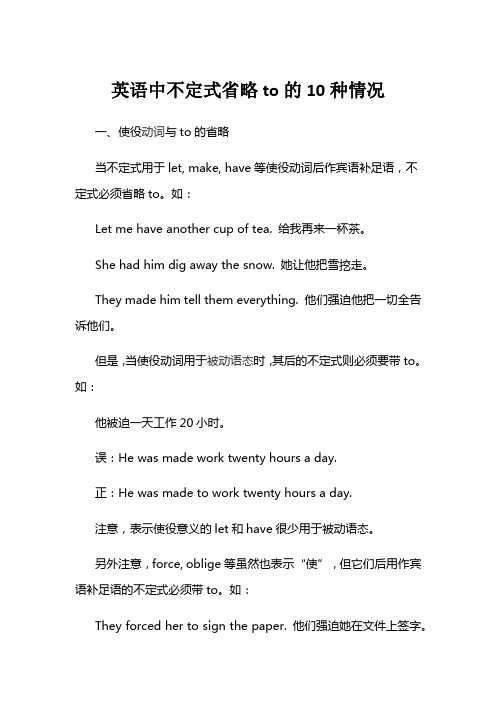
英语中不定式省略to的10种情况一、使役动词与to的省略当不定式用于let, make, have等使役动词后作宾语补足语,不定式必须省略to。
如:Let me have another cup of tea. 给我再来一杯茶。
She had him dig away the snow. 她让他把雪挖走。
They made him tell them everything. 他们强迫他把一切全告诉他们。
但是,当使役动词用于被动语态时,其后的不定式则必须要带to。
如:他被迫一天工作20小时。
误:He was made work twenty hours a day.正:He was made to work twenty hours a day.注意,表示使役意义的let和have很少用于被动语态。
另外注意,force, oblige等虽然也表示“使”,但它们后用作宾语补足语的不定式必须带to。
如:They forced her to sign the paper. 他们强迫她在文件上签字。
The law obliged parents to send their children to school. 法律要求父母送子女上学。
二、感觉动词与to的省略当不定式用于表示感觉的动词feel, hear, notice, observe, see, watch, look at, listen to等作宾语补足语时,不定式必须省略to。
如:We all felt the house shake. 我们都感觉这房子在震动。
I heard him go down the stairs. 我听见他下楼了。
Did you notice her leave the house? 她离开屋子你注意到了吗?I watched her get into the car. 我看着她上了车。
但是,当feel后用作宾语补足语的不定式为to be时,则不能省略to。
不定式省略to的10种情况

不定式省略to的几种情况一、使役动词与to的省略当不定式用于let, make, have等使役动词后作宾语补足语,不定式必须省略to。
如:Let me have another cup of tea.给我再来一杯茶。
She had him dig away the snow.她让他把雪挖走。
They made him tell them everything.他们强迫他把一切全告诉他们。
但是,当使役动词用于被动语态时,其后的不定式则必须要带to。
如:他被迫一天工作20小时。
误:He was made work twenty hours a day.正:He was made to work twenty hours a day.注意,表示使役意义的let和have很少用于被动语态。
另外注意,force, oblige等虽然也表示“使”,但它们后用作宾语补足语的不定式必须带to。
如:They forced her to sign the paper.他们强迫她在文件上签字。
The law obliged parents to send their children to school.法律要求父母送子女上学。
二、感觉动词与to的省略当不定式用于表示感觉的动词feel, hear, notice, observe, see, watch, look at, listen to等作宾语补足语时,不定式必须省略to。
如:We all felt the house shake.我们都感觉这房子在震动。
I heard him go down the stairs.我听见他下楼了。
Did you notice her leave the house?她离开屋子你注意到了吗?I watched her get into the car.我看着她上了车。
但是,当feel后用作宾语补足语的不定式为to be时,则不能省略to。
省略to的动词不定式

"大家都知道在动词不定式to do中,“to”是不定式的标志,有了这个to,后面所跟的动词该用原形。
但是to也有可以省略的时候,这个时候虽然没有了to,后面所跟的动词依然用原形。
今天的每日一课就给大家总结一些省略to的动词不定式。
1、情态动词(除ought 外)后的to已省略。
例:You must go to the hospital first. 你必须先去医院。
I can swim well. 我能游得很好。
2、使役动词let, have, make后,感官动词see, watch, look at, notice , observe, hear, listen to, smell, feel, find 等词后的to省略。
例:He made the baby crying all night long. 他让那个婴儿哭了一整夜。
Let it be. 就这样吧。
when I passed by, I saw the girl picking the flowers. 我经过的时候,看见那个女孩在摘花。
注意:在这些词的用法中,用于被动语态时不能省去to。
例:I saw him dance. 我看见他跳舞。
=He was seen to dance.The boss made them work the whole night. 老板让他们整夜干活。
=They were made to work the whole night.3、would rather/had better 后的to省略。
例:I would rather go to Japan than the USA.我宁愿去日本也不想去美国。
You had better take a hat with you.你最好带上一顶帽子。
4、why…/why not…句型中not后to省略。
例:why not come to my home for a dinner tonight?今晚何不来我家吃顿饭。
不定式省略to的10种情况

不定式省略to的10种情况摘自《第二课堂》(原作者:黄静香)一、使役动词与to的省略当不定式用于let, make, have等使役动词后作宾语补足语,不定式必须省略to。
如:Let me have another cup of tea. 给我再来一杯茶。
She had him dig away the snow. 她让他把雪挖走。
They made him tell them everything. 他们强迫他把一切全告诉他们。
但是,当使役动词用于被动语态时,其后的不定式则必须要带to。
如:他被迫一天工作20小时。
误:He was made work twenty hours a day.正:He was made to work twenty hours a day.注意,表示使役意义的let和have很少用于被动语态。
另外注意,force, oblige等虽然也表示“使”,但它们后用作宾语补足语的不定式必须带to。
如:They forced her to sign the paper. 他们强迫她在文件上签字。
The law obliged parents to send their children to school. 法律要求父母送子女上学。
二、感觉动词与to的省略当不定式用于表示感觉的动词feel, hear, notice, observe, see, watch, look at, listen to 等作宾语补足语时,不定式必须省略to。
如:We all felt the house shake. 我们都感觉这房子在震动。
I heard him go down the stairs. 我听见他下楼了。
Did you notice her leave the house? 她离开屋子你注意到了吗?I watched her get into the car. 我看着她上了车。
但是,当feel后用作宾语补足语的不定式为to be时,则不能省略to。
不定式省略to的10种情况
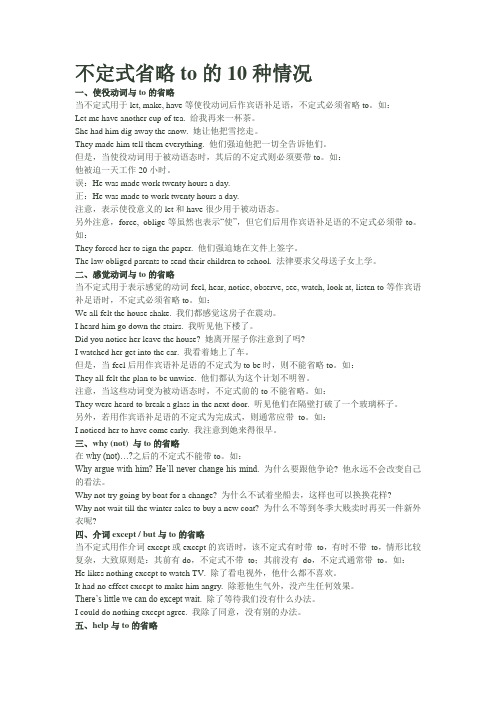
不定式省略to的10种情况一、使役动词与to的省略当不定式用于let, make, have等使役动词后作宾语补足语,不定式必须省略to。
如:Let me have another cup of tea. 给我再来一杯茶。
She had him dig away the snow. 她让他把雪挖走。
They made him tell them everything. 他们强迫他把一切全告诉他们。
但是,当使役动词用于被动语态时,其后的不定式则必须要带to。
如:他被迫一天工作20小时。
误:He was made work twenty hours a day.正:He was made to work twenty hours a day.注意,表示使役意义的let和have很少用于被动语态。
另外注意,force, oblige等虽然也表示“使”,但它们后用作宾语补足语的不定式必须带to。
如:They forced her to sign the paper. 他们强迫她在文件上签字。
The law obliged parents to send their children to school. 法律要求父母送子女上学。
二、感觉动词与to的省略当不定式用于表示感觉的动词feel, hear, notice, observe, see, watch, look at, listen to等作宾语补足语时,不定式必须省略to。
如:We all felt the house shake. 我们都感觉这房子在震动。
I heard him go down the stairs. 我听见他下楼了。
Did you notice her leave the house? 她离开屋子你注意到了吗?I watched her get into the car. 我看着她上了车。
但是,当feel后用作宾语补足语的不定式为to be时,则不能省略to。
不定式中省去to的十种情况

一、使役动词与to的省略
<注意2> get, force, oblige等虽然也表示“使”,但它们后用作 宾 语补足语的不定式必须带to。
Eg. 1.They forced her to sign the paper. 他们强迫她在文件上签字。 2.The law obliged parents to send their children to school. 法律要求父母送子女上学。 3. You can get him to finish his homework. 你可以让他完成他的作业。
第2页/共17页
二.感觉动词与to的省略
当不定式用于表示感觉的动词feel, hear, notice, observe, see, watch, look at, listen to, sense等作宾语补足语时,不定式必须省 略to。 eg. 1.We all felt the house shake.
我宁愿走着去,而不愿坐公共汽车去。 4. may/might as well+动词原形,意为“不妨做……” eg. You might as well go without her.
你们还是不带她去为好。
第13页/共17页
十.固定搭配与to的省略
5.can not but
cannot choose but
听见他们在隔壁打破了一个玻璃杯子。 <注意3> 若用作宾语补足语的不定式为完成式,则通常应带 to。 eg. I noticed her to have come early.
我注意到她来得很早。
第4页/共17页
三.介词except / but与to的省略
当不定式用作介词except / but的宾语时,大致原则是:其前有 do,不定式不带 to;其前没有 do,不定式通常带 to。 eg. 1.He likes nothing but to watch TV.
不定式中省去to的十种情况

不定式中省去to旳十种情况
一.使役动词与to旳省略
当不定式用于let, make, have等使役动词后作宾语补足语,不定 式必须省略to。 eg. 1.Let me have another cup of tea.
给我再来一杯茶。 2.She had him dig away the snow.
七.主语带do表语省略to旳情况
在主语以what、all、the only thing等开头旳包括行为动词do 旳句子中,作为表语旳不定式常可省略to。 eg. 1.All you do now is (to) complete the form.
你目前要做旳只是把这张表填好。 2.The only thing to do now is (to) go on. 迈进是目前唯一旳出路。 3.What I’ll do is (to) tell her the truth. 我要做旳就是告诉她真相。
她想去就能够去。
十.固定搭配与to旳省略
1.had better+动词原形,最佳做某事 eg. You had better stay here.
你最佳呆在这里。 2.“would rather+动词原形”, 意为“宁愿做某事”
eg. 1)We’d rather stay at home.
我们宁愿呆在家里。 2)I would rather not tell him.
二.感觉动词与to旳省略
当不定式用于表达感觉旳动词feel, hear, notice, observe, see, watch, look at, listen to, sense等作宾语补足语时,不定式必须省 略to。 eg. 1.We all felt the house shake.
英语中不定式省略to的九种情况
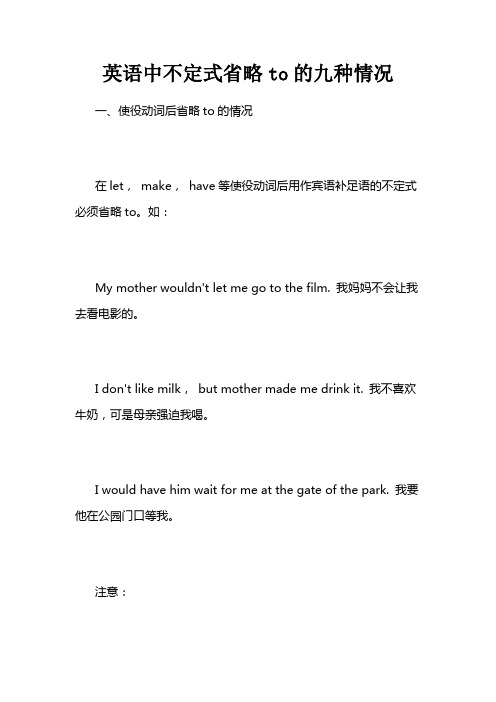
英语中不定式省略to的九种情况一、使役动词后省略to的情况在let,make,have等使役动词后用作宾语补足语的不定式必须省略to。
如:My mother wouldn't let me go to the film. 我妈妈不会让我去看电影的。
I don't like milk,but mother made me drink it. 我不喜欢牛奶,可是母亲强迫我喝。
I would have him wait for me at the gate of the park. 我要他在公园门口等我。
注意:1. 当使役动词用于被动语态时,要补上在主动语态中省略的to(主要是指make,let和have很少用于被动语态)。
2. force,oblige等虽然也表示“使”,但它们后用作宾语补足语的不定式必须带to。
如:He forced me to go with them. 他迫使我同他们一起去。
The police obliged him to leave. 警方强迫他离开。
二、感觉动词后省略to的情况在感觉动词后用作宾语补足语的不定式必须省略to。
如:I watched her get into the car. 我看着她上了车。
I saw the woman enter a bank. 我看见这个女人进了一家银行。
We often hear her sing this song. 我们经常听到她唱这首歌。
Did you notice her leave the house?她离开屋子你注意到了吗?注意:1. 这里所说的感觉动词主要包括see,hear,observe,notice,feel,watch等。
但是它们用于被动语态时,其后的不定式必须带to。
如:The woman was seen to enter a bank. 有人看见这个女人进了一家银行。
但是,用于以上句型的动词notice 和watch通常不用于被动语态。
九种不定式省略to的情况
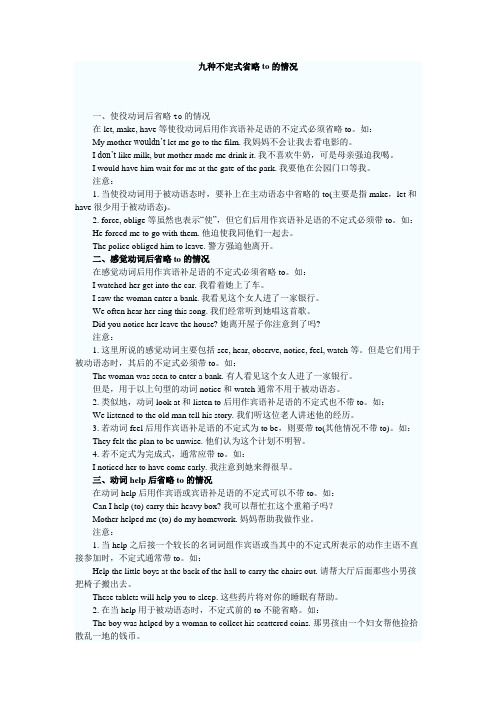
九种不定式省略to的情况一、使役动词后省略to的情况在let, make, have等使役动词后用作宾语补足语的不定式必须省略to。
如:My mother wouldn’t let me go to the film. 我妈妈不会让我去看电影的。
I don’t like milk, but mother made me drink it. 我不喜欢牛奶,可是母亲强迫我喝。
I would have him wait for me at the gate of the park. 我要他在公园门口等我。
注意:1. 当使役动词用于被动语态时,要补上在主动语态中省略的to(主要是指make,let和have很少用于被动语态)。
2. force, oblige等虽然也表示“使”,但它们后用作宾语补足语的不定式必须带to。
如:He forced me to go with them. 他迫使我同他们一起去。
The police obliged him to leave. 警方强迫他离开。
二、感觉动词后省略to的情况在感觉动词后用作宾语补足语的不定式必须省略to。
如:I watched her get into the car. 我看着她上了车。
I saw the woman enter a bank. 我看见这个女人进了一家银行。
We often hear her sing this song. 我们经常听到她唱这首歌。
Did you notice her leave the house? 她离开屋子你注意到了吗?注意:1. 这里所说的感觉动词主要包括see, hear, observe, notice, feel, watch等。
但是它们用于被动语态时,其后的不定式必须带to。
如:The woman was seen to enter a bank. 有人看见这个女人进了一家银行。
但是,用于以上句型的动词notice 和watch通常不用于被动语态。
- 1、下载文档前请自行甄别文档内容的完整性,平台不提供额外的编辑、内容补充、找答案等附加服务。
- 2、"仅部分预览"的文档,不可在线预览部分如存在完整性等问题,可反馈申请退款(可完整预览的文档不适用该条件!)。
- 3、如文档侵犯您的权益,请联系客服反馈,我们会尽快为您处理(人工客服工作时间:9:00-18:30)。
不定式省略to的九种情况一、使役动词后省略to的情况在let, make, have等使役动词后用作宾语补足语的不定式必须省略to。
如:Mymotherwouldn’tletmegothefilm.我妈妈不会让我去看电影的。
Idon’tlikemilk,butmothermademedrinkit.我不喜欢牛奶,可是母亲强迫我喝。
Iwouldhavehimwaitfor me at the gate of the park.我要他在公园门口等我。
注意:1.当使役动词用于被动语态时,要补上在主动语态中省略的to(主要是指make,let和have很少用于被动语态)。
2. force, oblige等虽然也表示“使”,但它们后用作宾语补足语的不定式必须带to。
如:He forced me to go with them.他迫使我同他们一起去。
The police obliged him to leave.警方强迫他离开。
二、感觉动词后省略to的情况在感觉动词后用作宾语补足语的不定式必须省略to在感觉E:10.5pt;mso-ascii-font-family:'Times New Roman'; mso-bidi-font-family:'TimesNewRoman'">。
如:Iwatchedhergetintothecar.我看着她上了车。
Isawthewomanenterabank.我看见这个女人进了一家银行。
Weoftenhearhersingthis song.我们经常听到她唱这首歌。
Did you notice her leave the house?她离开屋子你注意到了吗?注意:1.这里所说的感觉动词主要包括see, hear,observe, notice, feel, watch等。
但是它们用于被动语态时,其后的不定式必须带to。
如:Th 'Times New Roman'">有人看见这个女人进了一家银行。
但是,用于以上句型的动词notice和watch通常不用于被动语态。
2.类似地,动词lookat和listento后用作宾语补足语的不定式也不带to。
如:Welistenedto the old man tell his story.我们听这位老人讲述他的经历。
3.若动词feel后用作宾语补足语的不定式为tobe,则要带tobeto(其他情况不带to)。
如:They felt the plan to be unwise.他们认为这个计划不明智。
4.若不定式为完成式,通常应带to。
如:。
如:三、动词help后省略to的情况在动词help后用作宾语或宾语补足语的不定式可以不带to。
如:CanIhelp(to)carrythisheavybox?我可以帮忙扛这个重箱子吗?Motherhelpedme(to)domyhomework.妈妈帮助我做作业。
注意:1.当help之后接一个较长的名词词组作宾语或当其中的不定式所表示的动作主语不直接参加时,不定式通常带to。
如:Helpthelittleboysatthebackofthehalltocarrythechairsout.请帮大厅后面那些小男孩把椅子搬出去。
请帮大厅后面那些小男孩把椅子搬出去。
Thesetabletswillhelp youtosleep.这些药片将对你的睡眠有帮助。
2.在当help用于被动语态时,不定式前的to不能省略。
如:Theboywashelpedbya woman to collect his scattered coins.那男孩由一个妇女帮他捡拾散乱一地的钱币。
四、why (not)…后省略to的情况在why(not)…?之后的不定式不能带to。
如:Whygowithhim?为什么要同他一起去?Why not ask the teacher?为什么不去问问老师?Why not try toexpand your story into a novel?你怎么不把你的故事扩展成小说呢?五、动词know后省略to的情况在“know+宾语+不定式”中,不定式有时省略to,有时不省,可分以下两种情况讨论:1.若know为现在式,该结构中的不定式只限于tobe,且其中的to不能省略。
如:Iknowhimtobeill.我知道他病了。
Weknewhertobehonest.我们知道她是诚实的。
2.若know为完成式或过去式,则该结构中的不定式可以用除to be外的其他动词,且此时其中的to可以省留。
如:I never knew him(to)dosuchathing.我从未听说他会干那种事。
We’veneverknownhim(to)tellalie.我们从未听说他撒过谎。
I’veneverknownit(to)snowinJulybefore.我从未听说过有七月下雪的事。
但在被动语态中不定式前的to不能省略。
这样用的know不仅仅表示一般意义的“知道”,而是表示一种经历,因此常译为“曾“……过”(用于肯定句时)或“(从来)没有……过”(用于否定句时)。
六、介词except / but后省略to的情况用作介词except, but宾语的不定式有时带tw Roman'">except, but,有时不带to。
其大致原则是:若其前出现了动词do,其后的不定式通常不带to;若其前没有出现动词do,则其后的不定式通常带to。
如:Ihadnochoicebuttowait.除了等,我没有别的选择。
He wanted nothing but to stay there.他只想留在那儿。
Ithadnoeffectexcepttomakehimangry.除惹他生气外,没产生任何效果。
She can do everything except cook.除了做饭之外她什么都会。
七、主语带do表语省略to的情况当主语部分有动词do的某种形式时,用作表语的不定式可以省略to。
如:八、并列不定式省略to的情况当两个或多个作用相同的不定式并列时,通常只需在第一个不定式前用to,其余不定式前的to可以省略。
如:Hetoldmetostaythereandwaitforhim.他叫我在那儿等他。
I’m really puzzled what to think or say. 我真不知该怎么想怎么说。
我真不知该怎么想怎么说。
Itiseasiertopersuadepeoplethan(to) force them.说服人容易,强迫人难。
但是,如果两者有对比关系,则后面不定式前的to不可省略。
如:To try and fail is better than not to tryat all.尝试而失败总比不尝试好。
九、省略不定式是否保留to在一定的上下文中,为了避免重复,有时不定式可以省略,但通常保留不定式符号to。
如:IshallgoifIwantto.如果我想去就去.“Don’tbelate.”“I’ll try not to.” “不要来晚了。
”“我尽量不来晚。
”Don’t go tillI tell you to.等我叫你走你再走。
注意:1.若被省略的不定式为tobe短语,则通常应保留tobe。
如:Heisnotthemanhe used to be.他已不是原来的那个样子了。
2.有时省略不定式时,同时也可省略to。
如:">toShemaygoifshelikes(to).她想去就可以去。
动词不定式省略to的情况:(1)不定式在感观动词(see,notice,lookat,listento,hear,watch,feel,observe)、使役动词(let, make, have)后作宾语补足语时,通常省去to。
如:(2)不定式在help后作宾补时,可带to,也可省略to。
如:I helped him(to)find his lost watch.注意:以上两种情况变成被动语态时要加上to。
如:She was seen to go into the classroom.(3)如果两个或多个不定式并列使用时,常在第一个不定式前面加to,后面一般都省略。
如:To try and fail is better than not to try at all.6.“疑问词+不定式”组成的不定式短语在句中可以作主语、宾语和表语。
如:She told me when to start.四、接现在分词作宾补的20个常用动词bring sb. doing sth.引起某人做某事catch sb. doing sth.碰上(撞上)某人做某事discover sb. doing sth.发现某人做某事feel sb. doing sth.感觉某人做某事find sb. doing sth.碰上(撞上)某人做某事get sb. doing sth.使某人做某事have sb.doing sth.使某人做某事hear sb. doing sth.听见某人做某事keep sb. doing sth.使某人不停地做某事listen to sb. doing sth.听某人做某事look at sb. doing sth.看着某人做某事notice sb. doing sth.注意到某人做某事observesb.doingsth.观察某人做某事preventsb.doingsth.阻止某人做某事see sb. doing sth.看见某人做某事send sb. doing sth.使某人(突然)做某事set sb. doing sth.使(引起)某人做某事start sb. doing sth.使某人开始做某事stop sb. doing sth.阻止某人做某事watch sb. doing sth.观五、接动词原形作宾补的11个常用动词feel sb. do sth.感觉某人做某事have sb. do sth.使某人做某事hear sb. do sth.听见某人做某事let sb. do sth.让某人做某事listen to sb. do sth.听着某人做某事look at sb. do sth.看着某人做某事make sb. do sth.使某人做某事notice sb. do sth.注意某人做某事observe sb. do sth.观察某人做某事see sb. do sth.看见某人做某事watch sb. do sth.观察某人做某事。
